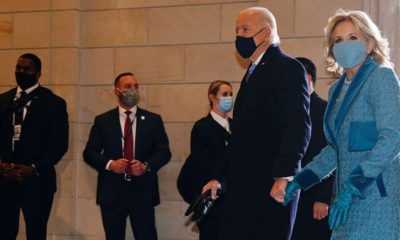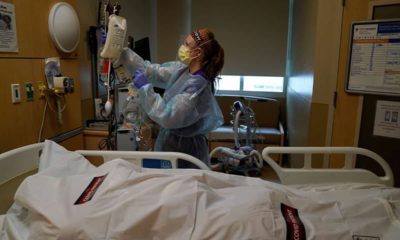Published
4 years agoon

California’s fiscal squeeze tightened up Sunday when congressional leaders reached agreement on a $900 billion COVID-19 relief package that did not include direct aid to state and local governments.
It means that Gov. Gavin Newsom faces fewer choices in fashioning a 2021-22 fiscal year budget that he must propose to legislators by Jan. 10 and that California cities struggling with budget deficits won’t be getting help from Washington.

Dan Walters
Opinion
For the last six months, ever since the state passed its current budget, Newsom and legislative leaders have been crossing their fingers that a second relief package from Washington would offset the contingent spending cuts and off-budget borrowing they used to make it balance on paper.
The hoped-for but elusive number was $14 billion. However, Newsom, et al, have since gotten some good news from California taxpayers. Administration forecasts that revenues would plummet into the abyss as pandemic-spawned recession struck the state proved to be too pessimistic.
All-important income taxes have held up unexpectedly well because affluent Californians, who provide the bulk of income taxes, have largely maintained their income streams by shifting to home work while their stock market holdings have soared in value.
Steadier-than-expected income taxes, coupled with the spending cuts made in June, are producing a one-time $26 billion windfall for the state, according to Gabe Petek, the Legislature’s budget analyst. However, with economic recovery slowing due to new pandemic shutdowns, administration officials see a somewhat lower windfall.
Whatever its size, the windfall potentially offsets the lack of a new federal bailout, but also creates its own dilemma.
Should the extra money be socked away to guard against projected deficits in the future or be spent on education, health care and safety net services that were cut in vain hopes of more federal aid?
Advocates for those services, including legislative leaders, tend toward a spend-it-now approach, but were they to prevail and the projected deficits became reality, the political onus would fall on Newsom.
An unspoken, but very real, aspect to the situation is that many liberal groups and allied Democratic legislators want the state to raise taxes on corporations and/or the wealthiest Californians not only to fill current holes but to permanently increase spending on education, health care, homelessness and social services.
Tax increase advocates contend that the pandemic has widened California’s already immense gaps of wealth and income that should be narrowed by spending more on programs to assist those on the lower rungs of the economic ladder.
Newsom is caught in the middle of the great tax debate. He supported Proposition 15, the unsuccessful effort to raise taxes on commercial property, but in doing so, threw cold water on calls for new taxes on income or wealth.
Newsom clearly fears that the threat of such levies would drive the wealthy, who supply most of the state’s revenues, to flee the state. That fear was underscored this month when Elon Musk, the billionaire founder of Tesla, declared that he was personally moving to Texas, which has no income tax, and increasing Tesla’s presence in that state.
Newsom’s 2021-22 budget will probably take a middle-of-the-road course — spending some but not all of the windfall, setting aside demands for new taxes and once again hoping that when Joe Biden becomes president, an aid package for state and local governments will be fashioned.
“Those fiscal pressures are still going to be there next month, when a new Congress and a new administration take office,” H.D. Palmer, the spokesman for Newsom’s budget office, said after the aid package was announced on Sunday.
CalMatters is a public interest journalism venture committed to explaining how California’s state Capitol works and why it matters. For more stories by Dan Walters, go to calmatters.org/commentary.


Tulare County Gang Member, Two Fresnans Head to Federal Prison


Study: First 10 Days After Leaving Hospital Pose Deadly Risks for COVID Patients


California Pins Vaccine Hopes on Biden Administration


Bay Area Restaurants, Wineries File Lawsuit Over Outdoor Dining Ban


Madera Hospital, With ICU Inundated, Transfers Patients to Other Facilities


‘Shameful’: US Virus Deaths Top 400k as Trump Leaves Office




